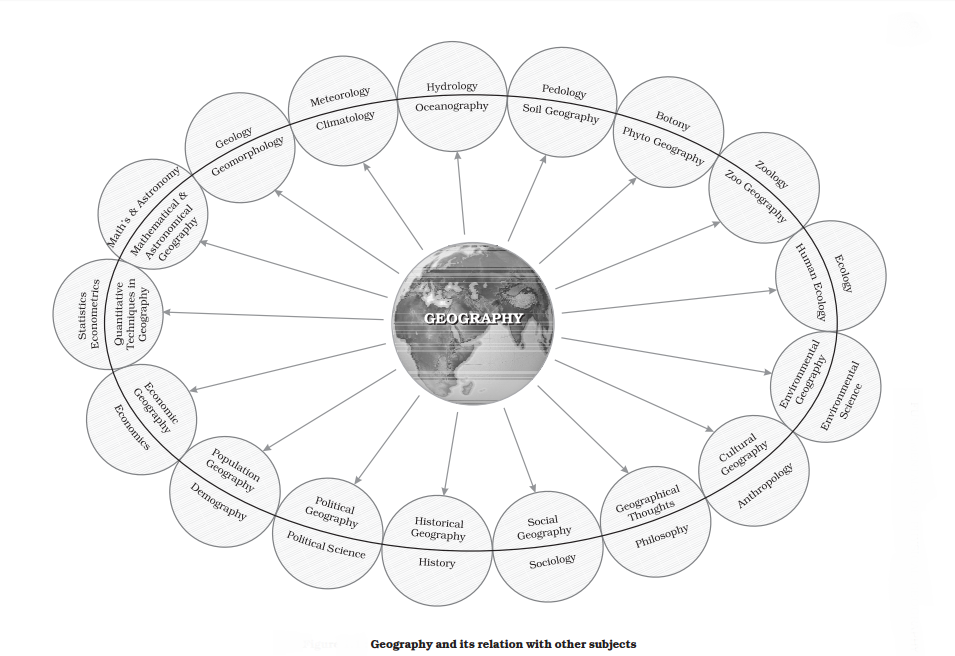NCERT notes on important topics for the UPSC civil services exam. These notes will also be useful for other competitive exams like banking PO, SSC, state civil services exams and so on. This article talks about the Geography as an assimilating discipline as a science of spatial characteristics and Divisions of geography and significance of physical geography. Geography is an essential part of the UPSC Syllabus both prelims and mains. It is also important for candidates to understand how to read NCERTs for the UPSC exam.
What is Geography?
- The term geography was first devised by Eratosthenes, a Greek scholar (276-194 BC.)
- Geography is a discipline of the combination of spatial synthesis and temporal synthesis.
- According to geography, Earth is described as the abode of human beings.
- Landforms provide the foundation on which anthropogenic activities are placed.
- The plains are used for agriculture.
- Plateaus provide a platform for minerals and forest.
- Mountains make available space for meadows, forests, tourist spots, etc. They are regarded as the sources of rivers.
Geography as a Discipline (UPSC Notes):- Download PDF Here
Branches of Geography
- Physical Geography
- Human Geography
- Biogeography

Physical Geography
- Geomorphology is a branch of Geography dealing with the study of landforms, the formation of landforms, and associated courses.
- Climatology includes the study of atmosphere structure, elements of weather, climate, climatic types and climatic regions.
- Hydrology deals with the study of water present on the surface of the earth comprising oceans, rivers, lakes and other water bodies, its influence on various life forms on earth and allied activities.
- Soil Geography is to study the courses of soil formation, types of soil, fertility status of soils, soil distribution and utilization.
-
Human Geography
- Social/Cultural Geography covers the study of society and the spatial dynamics of society and the cultural aspects caused by society.
- Population Geography encompasses the population growth, density, distribution, migration, sex ratio and occupational structure, and so on.
- Settlement Geography deals with the features of urban and rural settlements.
- Economic Geography is related to people’s economic activities comprising agriculture, industry, services, trade, transport, infrastructure, etc.
- Historical Geography deals with the historical processes by which space gets organised. The geographical features also go through temporal changes; these are the issues of historical geography.
- Political Geography is the study of the spatially unbalanced results of political courses and the various manners in which political processes are themselves influenced by spatial structures.
-
Biogeography
- The interface between human geography and physical geography has led to the progress of Biogeography which contains:
- Ecology and Ecosystem deal with the scientific study of the features of the habitat of species.
- Plant Geography which deals with the spatial structure and order of natural vegetation in their environments.
- Zoo Geography which is concerned with the spatial patterns as well as geographic features of various fauna and their habitats.
Geography as a Discipline (UPSC Notes):- Download PDF Here
Also See:
| The Origin and Evolution of the Earth-Theories | Structure of the Earth | Continental Drift |
| Our Changing Earth – NCERT | Inside our Earth | Major Domains of the Earth |
UPSC Preparation
| IAS Exam | UPSC Syllabus |
| UPSC Exam Pattern | UPSC 2024 |
| UPSC Books | Daily News Analysis |
| UPSC Previous Year Question Papers | IAS Current Affairs |
| UPSC Prelims | Daily Video Analysis: The Hindu |
Comments